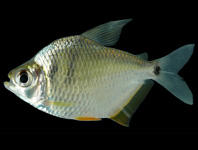Abstract
The presence of complex geographic variation among species allied to the absence of clear morphological breaks among populations has led to many poorly defined taxa in the genus Pyrrhura (Psittacidae: Arinae: Arini). This article addresses nomenclature of the Pyrrhura picta species complex, particularly the identity of three little-known names introduced by Miranda-Ribeiro (1926): Pyrrhura luciani ochrotis, P. l. pallescens and P. l. melanoides. We show that these names represent subjective synonyms of Pyrrhura snethlageae Joseph & Bates, 2002. Furthermore, we argue that Pyrrhura pallescens (Miranda-Ribeiro, 1926) n. comb. should be considered as the valid senior name because: (1) there is no doubt about the type locality (near the type locality of P. snethlageae) and, as a consequence, it “will best serve stability and universality of nomenclature” as recommended by the International Code of Zoological Nomenclatural, and; (2) it corresponds to the most common phenotype usually referred to as P. snethlageae, the species name that has been used for bird specimens from this region. Those considering P. snethlageae lucida Arndt, 2008 as a valid taxon should refer to this population as Pyrrhura pallescens lucida (Arndt, 2008) n. comb. In a near future P. pallescens melanoides (Miranda-Ribeiro, 1926) n. comb. is likely to be considered the best senior synonym of P. p. lucida given its type locality (Teles Pires River, MT).
References
Anonymous [International Commission on Zoological Nomenclature] (1999) International Code of Zoological Nomenclature. Fourth edition. London, International Trust for Zoological Nomenclature, i–xxix + 1–306.
Arndt, T. (2008) Anmerkungen zu einigen Pyrrhura-Formen mit der Beschreibung einer neuen Art und zweier neuer Unterarten. Papageien, 8, 278–286.
Bonaparte, C.L.J.L. (1856) Conspectus Psittacorum. Naumannia, 6, 352–356.
Deville, M.E. (1851) Note sur quatre espèces nouvelles d’oiseaux provenant de l’expédition de M. Castelnau: le Conurus weddellii, C. jugularis, C. luciani et Cultrides pucheranii. Revue et Magasin de Zoologie pure et appliquée, 2–3, 209–213.
Dickinson, E.C. & Remsen, J.V. (Ed.), (2013) The Howard and Moore complete checklist of birds of the world. Fourth edition. Vol. 1: Non-Passerines. Eastbourne, Aves Press, 461 pp.
Gonzaga, L.P. (1989) Catálogo de tipos na coleção ornitológica do Museu Nacional. I. Não-Passeriformes. Boletim do Museu Paraense Emílio Goeldi, Nova Série, Zoologia, 5 (1), 9–39.
Griscom, L. & Greenway, J.C. (1941) Birds of Lower Amazonia. Bulletin of the Museum of Comparative Zoology, 88, 84–344.
Gyldenstolpe, N. (1945) The bird fauna of Rio Juruá in western Brazil. Kungliga Svenska Vetenskaps Akademiens Handlingar, 22 (3), 1–338.
Hellmayr, C.E. (1906) [Untitled]. Bulletin of the British Ornithologists’ Club, 19, 8.
Hellmayr, C.E. (1907) On a collection of birds made by Mr. W. Hoffmanns on the Rio Madeira, Brazil. Novitates Zoologicae, 14, 343–412.
Hellmayr, C.E. (1910) The birds of the Rio Madeira. Novitates Zoologicae, 17, 257–428.
https://doi.org/10.5962/bhl.title.875Joseph, L. (2000) Beginning an end to 63 years of uncertainty: the Neotropical parakeet know as Pyrrhura picta and P. leucotis comprise more than two species. Proceedings of the Academy of natural Science of Philadelphia, 150, 279–292.
Joseph, L. (2002) Geographical variation, taxonomy and distribution of some Amazonian Pyrrhura parakeets. Ornitologia neotropical, 13, 337–363.
Miranda-Ribeiro, A. & Soares, E.C. (1920) Os Psittacídeos da “Comissão Rondon”. In: Comissão de Linhas Telegráphicas Estratégicas de Matto-Grosso ao Amazonas, Publicação n° 63, Anexo n° 5, Rio de Janeiro, História Natural, pp. 6–14.
Miranda-Ribeiro, A. (1926) Psittacideos colligidos pelo Sr. Dr. Rud. Pfrimer em Minas Geraes e Goyaz. Arquivos do Museu Nacional, 28, 10–12.
Naumburg, E.M.B. & Cherrie, G.K. (1930) The birds of Matto Grosso, Brazil: a report on the birds secured by the Roosevelt-Rondon Expedition. Bulletin of the American Museum of natural History, 60, 1–431.
Peters, J.L. (1937) Check-list of birds of the world. Volume 3. Cambridge, Harvard University Press, 311 pp..
Pinto, O.M.O. (1978) Novo catálogo das Aves do Brasil. Primeira parte: Aves não Passeriformes e Passeriformes não Oscines com exclusão da família Tyrannidae. São Paulo, Empresa Gráfica da Revista dos Tribunais S.A. São Paulo, 446 pp.
Ribas, C.C., Joseph, L. & Miyaki, C.Y. (2006) Molecular systematics and patterns of diversification in Pyrrhura (Psittacidae), with special reference to the picta-leucotis complex. Auk, 123, 660–680.
http://dx.doi.org/10.1642/0004-8038(2006)123[660:MSAPOD]2.0.CO;2Rondon, C.M.S. (1916) The Roosevelt-Rondon Scientific Expedition and the Telegraph Line Commission. Comissão de Linhas Thelegráficas Estratégicas de Matto-Grosso ao Amazonas. Publicação n. 42. Rio de Janeiro, Typ. Leuzinger, 299 pp.
Sá, D.M., Sá, M.R. & Lima, N.T. (2008) Telégrafos e inventário do Território no Brasil: as atividades Científicas da Comissão Rondon (1907–1915). História, Ciência e Saúde – Manguinhos, 15 (3), 779–810.
https://doi.org/10.1590/s0104-59702008000300011Snethlage, E. (1914) Catálogo das Aves Amazônicas contendo todas as espécies descriptas e mencionadas até 1913. Boletim do Museu Paraense Emílio Goeldi, 8, 1–530.
Statius Müller, P.L. (1776) Natursystems: Supplements und Registerband. Nurnberg, Gabriel Nildaus Kalpe, 536 pp.

